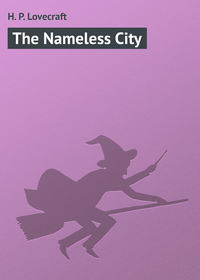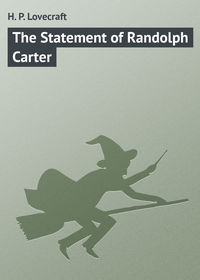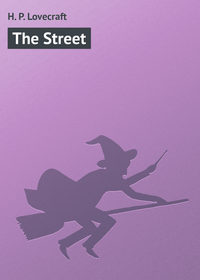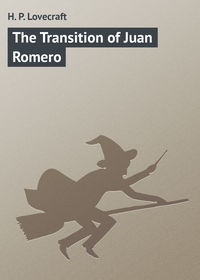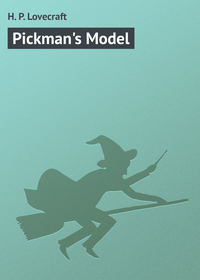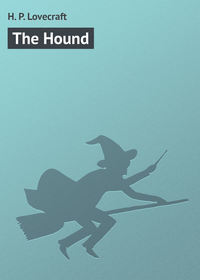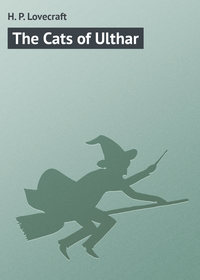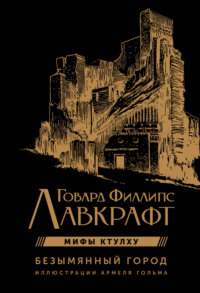
Полная версия
Dagon and Other Macabre Tales
Yet I soon subordinated all my fears to my growing curiosity and fascination. Just what Crawford Tillinghast now wished of me I could only guess, but that he had some stupendous secret or discovery to impart, I could not doubt. Before I had protested at his unnatural pryings into the unthinkable; now that he had evidently succeeded to some degree I almost shared his spirit, terrible though the cost of victory appeared. Up through the dark emptiness of the house I followed the bobbing candle in the hand of this shaking parody on man. The electricity seemed to be turned off, and when I asked my guide he said it was for a definite reason.
‘It would be too much…I would not dare,’ he continued to mutter. I especially noted his new habit of muttering, for it was not like him to talk to himself. We entered the laboratory in the attic, and I observed that detestable electrical machine, glowing with a sickly, sinister violet luminosity. It was connected with a powerful chemical battery, but seemed to be receiving no current; for I recalled that in its experimental stage it had sputtered and purred when in action. In reply to my question Tillinghast mumbled that this permanent glow was not electrical in any sense that I could understand.
He now seated me near the machine, so that it was on my right, and turned a switch somewhere below the crowning cluster of glass bulbs. The usual sputtering began, turned to a whine, and terminated in a drone so soft as to suggest a return to silence. Meanwhile the luminosity increased, waned again, and assumed a pale, outre colour or blend of colours which I could neither place nor describe. Tillinghast had been watching me, and noted my puzzled expression.
‘Do you know what that is?’ he whispered, ‘that is ultraviolet.’ He chuckled oddly at my surprise. ‘You thought ultra-violet was invisible, and so it is – but you can see that and many other visible things now.
‘Listen to me! The waves from that thing are waking a thousand sleeping senses in us; senses which we inherit from aeons of evolution from the state of detached electrons to the state of organic humanity. I have seen the truth, and I intend to show it to you. Do you wonder how it will seem? I will tell you.’ Here Tillinghast seated himself directly opposite me, blowing out his candle and staring hideously into my eyes. ‘Your existing sense-organs – ears first, I think – will pick up many of the impressions, for they are closely connected with the dormant organs. Then there will be others. You have heard of the pineal gland? I laugh at the shallow endocrinologist, fellow-dupe and fellow-parvenu of the Freudian. That gland is the great sense organ of organs – I have found out. It is like sight in the end, and transmits visual pictures to the brain. If you are normal, that is the way you ought to get most of it…I mean you get most of the evidence from beyond.’
I looked about the immense attic room with the sloping south wall, dimly lit by rays which the every-day eye cannot see. The far corners were all shadows, and the whole place took on a hazy unreality which obscured its nature and invited the imagination to symbolism and phantasm. During the interval that Tillinghast was silent I fancied myself in some vast incredible temple of long-dead gods; some vague edifice of innumberable black stone columns reaching up from a floor of damp slabs to a cloudy height beyond the range of my vision. The picture was very vivid for a while, but gradually gave way to a more horrible conception; that of utter, absolute solitude in infinite, sightless, soundless space. There seemed to be a void, and nothing more, and I felt a childish fear which prompted me to draw from my hip pocket the revolver I always carried after dark since the night I was held up in East Providence. Then, from the farthermost regions of remoteness, the sound softly glided into existence. It was infinitely faint, subtly vibrant, and unmistakably musical, but held a quality of surpassing wildness which made its impact feel like a delicate torture of my whole body. I felt sensations like those one feels when accidentally scratching ground glass. Simultaneously there developed something like a cold draught, which apparently swept past me from the direction of the distant sound. As I waited breathlessly I perceived that both sound and wind were increasing; the effect being to give me an odd notion of myself as tied to a pair of rails in the path of a gigantic approaching locomotive. I began to speak to Tillinghast, and as I did so all the unusual impressions abruptly vanished. I saw only the man, the glowing machines, and the dim apartment. Tillinghast was grinning repulsively at the revolver which I had almost unconsciously drawn, but from his expression I was sure he had seen and heard as much as I, if not a great deal more. I whispered what I had experienced and he bade me to remain as quiet and receptive as possible.
‘Don’t move,’ he cautioned, ‘for in these rays we are able to be seen as well as to see. I told you the servants left, but I didn’t tell you how. It was that thick-witted house-keeper – she turned on the lights downstairs after I had warned her not to, and the wires picked up sympathetic vibrations. It must have been frightful – I could hear the screams up here in spite of all I was seeing and hearing from another direction, and later it was rather awful to find those empty heaps of clothes around the house. Mrs Updike’s clothes were close to the front hall switch – that’s how I know she did it. It got them all. But so long as we don’t move we’re fairly safe. Remember we’re dealing with a hideous world in which we are practically helpless…Keep still!’
The combined shock of the revelation and of the abrupt command gave me a kind of paralysis, and in my terror my mind again opened to the impressions coming from what Tillinghast called ‘beyond’. I was now in a vortex of sound and motion, with confused pictures before my eyes. I saw the blurred outlines of the room, but from some point in space there seemed to be pouring a seething column of unrecognizable shapes of clouds, penetrating the solid roof at a point ahead and to the right of me. Then I glimpsed the temple-like effect again, but this time the pillars reached up into an aerial ocean of light, which sent down one blinding beam along the path of the cloudy column I had seen before. After that the scene was almost wholly kaleidoscopic, and in the jumble of sights, sounds, and unidentified sense-impressions I felt that I was about to dissolve or in some way lose the solid form. One definite flash I shall always remember. I seemed for an instant to behold a patch of strange night sky filled with shining, revolving spheres, and as it receded I saw that the glowing suns formed a constellation or galaxy of settled shape; this shape being the distorted face of Crawford Tillinghast. At another time I felt the huge animate things brushing past me and occasionally walking or drifting through my supposedly solid body, and thought I saw Tillinghast look at them as though his better trained senses could catch them visually. I recalled what he had said of the pineal gland, and wondered what he saw with this preternatural eye.
Suddenly I myself became possessed of a kind of augmented sight. Over and above the luminous and shadowy chaos arose a picture which, though vague, held the elements of consistency and permanence. It was indeed somewhat familiar, for the unusual part was superimposed upon the usual terrestrial scene much as a cinema view may be thrown upon the painted curtain of a theater. I saw the attic laboratory, the electrical machine, and the unsightly form of Tillinghast opposite me; but af all the space unoccupied by familiar objects not one particle was vacant. Indescribable shapes both alive and otherwise were mixed in disgusting disarray, and close to every known thing were whole worlds of alien, unknown entities. It likewise seemed that all the known things entered into the composition of other unknown things, and vice versa. Foremost among the living objects were inky, jellyish monstrosities which flabbily quivered in harmony with the vibrations from the machine. They were present in loathsome profusion, and I saw to my horror that they over-lapped; that they were semi-fluid and capable of passing through one another and through what we know as solids. These things were never still, but seemed ever floating about with some malignant purpose. Sometimes they appeared to devour one another, the attacker launching itself at its victim and instantaneously obliterating the latter from sight. Shudderingly I felt that I knew what had obliterated the unfortunate servants, and could not exclude the things from my mind as I strove to observe other properties of the newly visible world that lies unseen around us. But Tillinghast had been watching me, and was speaking.
‘You see them? You see them? You see the things that float and flop about you and through you every moment of your life? You see the creatures that form what men call the pure air and the blue sky? Have I not succeeded in breaking down the barrier; have I not shown you worlds that no other living men have seen?’ I heard his scream through the horrible chaos, and looked at the wild face thrust so offensively close to mine. His eyes were pits of flame, and they glared at me with what I now saw was overwhelming hatred. The machine droned detestably.
‘You think those floundering things wiped out the servants? Fool, they are harmless! But the servants are gone, aren’t they? You tried to stop me; you discouraged me when I needed every drop of encouragement I could get; you were afraid of the cosmic truth, you damned coward, but now I’ve got you! What swept up the servants? What made them scream so loud?…Don’t know, eh! You’ll know soon enough. Look at me – listen to what I say – do you suppose there are really any such things as time and magnitude? Do you fancy there are such things as form or matter? I tell you, I have struck depths that your little brain can’t picture. I have seen beyond the bounds of infinity and drawn down daemons from the stars…I have harnessed the shadows that stride from world to world to sow death and madness…Space belongs to me, do you hear? Things are hunting me now – the things that devour and dissolve – but I know how to elude them. It is you they will get, as they got the servants…Stirring, dear sir? I told you it was dangerous to move, I have saved you so far by telling you to keep still – saved you to see more sights and to listen to me. If you had moved, they would have been at you long ago. Don’t worry, they won’t hurt you. They didn’t hurt the servants – it was the seeing that made the poor devils scream so. My pets are not pretty, for they come out of places where aesthetic standards are – very different. Disintegration is quite painless, I assure you – but I want you to see them. I almost saw them, but I knew how to stop. You are curious? I always knew you were no scientist. Trembling, eh. Trembling with anxiety to see the ultimate things I have discovered. Why don’t you move, then? Tired? Well, don’t worry, my friend, for they are coming…Look, look, curse you, look…it’s just over your left shoulder…’
What remains to be told is very brief, and may be familiar to you from the newspaper accounts. The police heard a shot in the old Tillinghast house and found us there – Tillinghast dead and me unconscious. They arrested me because the revolver was in my hand, but released me in three hours, after they found it was apoplexy which had finished Tillinghast and saw that my shot had been directed at the noxious machine which now lay hopelessly shattered on the laboratory floor. I did not tell very much of what I had seen, for I feared the coroner would be skeptical; but from the evasive outline I did give the doctor told me that I had undoubtedly been hypnotized by the vindictive and homicidal madman.
I wish I could believe that doctor. It would help my shaky nerves if I could dismiss what I now have to think of the air and the sky about and above me. I never feel alone or comfortable, and a hideous sense of pursuit sometimes comes chillingly on me when I am weary. What prevents me from believing the doctor is this one simple fact – that the police never found the bodies of those servants whom they say Crawford Tillinghast murdered.
The Temple
(Manuscript found on the coast of Yucatan.)
On August 20, 1917, Karl Heinrich, Graf von Altberg-Ehrenstein, Lieutenant-Commander in the Imperial German Navy and in charge of the submarine U-29, deposit this bottle and record in the Atlantic Ocean at a point to me unknown but probably about N. Latitude 20 degrees, W. Longitude 35 degrees, where my ship lies disabled on the ocean floor. I do so because of my desire to set certain unusual facts before the public; a thing I shall not in all probability survive to accomplish in person, since the circumstances surrounding me are as menacing as they are extraordinary, and involve not only the hopeless crippling of the U-29, but the impairment of my iron German will in a manner most disastrous.
On the afternoon of June 18, as reported by wireless to the U-61, bound for Kiel, we torpedoed the British freighter Victory, New York to Liverpool, in N. Latitude 45 degrees 16 minutes, W. Longitude 28 degrees 34 minutes; permitting the crew to leave in boats in order to obtain a good cinema view for the admiralty records. The ship sank quite picturesquely, bow first, the stern rising high out of the water whilst the hull shot down perpendicularly to the bottom of the sea. Our camera missed nothing, and I regret that so fine a reel of film should never reach Berlin. After that we sank the lifeboats with our guns and submerged.
When we rose to the surface about sunset a seaman’s body was found on the deck, hands gripping the railing in curious fashion. The poor fellow was young, rather dark, and very handsome; probably an Italian or Greek, and undoubtedly of the Victory’s crew. He had evidently sought refuge on the very ship which had been forced to destroy his own – one more victim of the unjust war of aggression which the English pig-dogs are waging upon the Fatherland. Our men searched him for souvenirs, and found in his coat pocket a very odd bit of ivory carved to represent a youth’s head crowned with laurel. My fellow-officer, Lieutenant Klenze, believed that the thing was of great age and artistic value, so took it from the men for himself. How it had ever come into the possession of a common sailor neither he nor I could imagine.
As the dead man was thrown overboard there occurred two incidents which created much disturbance amongst the crew. The fellow’s eyes had been closed; but in the dragging of his body to the rail they were jarred open, and many seemed to entertain a queer delusion that they gazed steadily and mockingly at Schmidt and Zimmer, who were bent over the corpse. The Boatswain Müller, an elderly man who would have known better had he not been a superstitious Alsatian swine, became so excited by this impression that he watched the body in the water; and swore that after it sank it drew its limbs into a swimming position and sped away to the south under the waves. Klenze and I did not like these displays of peasant ignorance, and severely reprimanded the men, particularly Müller.
The next day a very troublesome situation was created by the indisposition of some of the crew. They were evidently suffering from the nervous strain of our long voyage, and had had bad dreams. Several seemed quite dazed and stupid; and after satisfying myself that they were not feigning their weakness, I excused them from their duties. The sea was rather rough, so we descended to a depth where the waves were less troublesome. Here we were comparatively calm, despite a somewhat puzzling southward current which we could not identify from our oceanographic charts. The moans of the sick men were decidedly annoying; but since they did not appear to demoralize the rest of the crew, we did not resort to extreme measures. It was our plan to remain where we were and intercept the liner Dacia, mentioned in information from agents in New York.
In the early evening we rose to the surface, and found the sea less heavy. The smoke of a battleship was on the northern horizon, but our distance and ability to submerge made us safe. What worried us more was the talk of Boatswain Müller, which grew wilder as night came on. He was in a detestably childish state, and babbled of some illusion of dead bodies drifting past the undersea portholes; bodies which looked at him intensely, and which he recognized in spite of bloating as having seen dying during some of our victorious German exploits. And he said that the young man we had found and tossed overboard was their leader. This was very gruesome and abnormal, so we confined Müller in irons and had him soundly whipped. The men were not pleased at his punishment, but discipline was necessary. We also denied the request of a delegation headed by Seaman Zimmer, that the curious carved ivory head be cast into the sea.
On June 20, Seamen Bohm and Schmidt, who had been ill the day before, became violently insane. I regretted that no physician was included in our complement of officers, since German lives are precious; but the constant ravings of the two concerning a terrible curse were most subversive of discipline, so drastic steps were taken. The crew accepted the event in a sullen fashion, but it seemed to quiet Müller; who thereafter gave us no trouble. In the evening we released him, and he went about his duties silently.
In the week that followed we were all very nervous, watching for the Dacia. The tension was aggravated by the disappearance of Müller and Zimmer, who undoubtedly committed suicide as a result of the fears which had seemed to harass them, though they were not observed in the act of jumping overboard. I was rather glad to be rid of Müller, for even his silence had unfavorably affected the crew. Everyone seemed inclined to be silent now, as though holding a secret fear. Many were ill, but none made a disturbance. Lieutenant Klenze chafed under the strain, and was annoyed by the merest trifles – such as the school of dolphins which gathered about the U-29 in increasing numbers, and the growing intensity of that southward current which was not on our chart.
It at length became apparent that we had missed the Dacia altogether. Such failures are not uncommon, and we were more pleased than disappointed; since our return to Wilhelmshaven was now in order. At noon June 28 we turned northeastward, and despite some rather comical entanglements with the unusual masses of dolphins were soon under way.
The explosion in the engine room at 2 A.M. was wholly a surprise. No defect in the machinery or carelessness in the men had been noticed, yet without warning the ship was racked from end to end with a colossal shock. Lieutenant Klenze hurried to the engine room, finding the fuel-tank and most of the mechanism shattered, and Engineers Raabe and Schneider instantly killed. Our situation had suddenly become grave indeed; for though the chemical air regenerators were intact, and though we could use the devices for raising and submerging the ship and opening the hatches as long as compressed air and storage batteries might hold out, we were powerless to propel or guide the submarine. To seek rescue in the life-boats would be to deliver ourselves into the hands of enemies unreasonably embittered against our great German nation, and our wireless had failed ever since the Victory affair to put us in touch with a fellow U-boat of the Imperial Navy.
From the hour of the accident till July 2 we drifted constantly to the south, almost without plans and encountering no vessel. Dolphins still encircled the U-29, a somewhat remarkable circumstance considering the distance we had covered. On the morning of July 2 we sighted a warship flying American colors, and the men became very restless in their desire to surrender. Finally Lieutenant Klenze had to shoot a seaman named Traube, who urged this un-German act with especial violence. This quieted the crew for the time, and we submerged unseen.
The next afternoon a dense flock of sea-birds appeared from the south, and the ocean began to heave ominously. Closing our hatches, we awaited developments until we realized that we must either submerge or be swamped in the mounting waves. Our air pressure and electricity were diminishing, and we wished to avoid all unnecessary use of our slender mechanical resources; but in this case there was no choice. We did not descend far, and when after several hours the sea was calmer, we decided to return to the surface. Here, however, a new trouble developed; for the ship failed to respond to our direction in spite of all that the mechanics could do. As the men grew more frightened at this undersea imprisonment, some of them began to mutter again about Lieutenant Klenze’s ivory image, but the sight of an automatic pistol calmed them. We kept the poor devils as busy as we could, tinkering at the machinery even when we knew it was useless.
Klenze and I usually slept at different times; and it was during my sleep, about 5 A.M., July 4, that the general mutiny broke loose. The six remaining pigs of seamen, suspecting that we were lost, had suddenly burst into a mad fury at our refusal to surrender to the Yankee battleship two days before; and were in a delirium of cursing and destruction. They roared like the animals they were, and broke instruments and furniture indiscriminately; screaming about such nonsense as the curse of the ivory image and the dark dead youth who looked at them and swam away. Lieutenant Klenze seemed paralyzed and inefficient, as one might expect of a soft, womanish Rhinelander. I shot all six men, for it was necessary, and made sure that none remained alive.
We expelled the bodies through the double hatches and were alone in the U-29. Klenze seemed very nervous, and drank heavily. It was decided that we remain alive as long as possible, using the large stock of provisions and chemical supply of oxygen, none of which had suffered from the crazy antics of those swine-hound seamen. Our compasses, depth gauges, and other delicate instruments were ruined; so that henceforth our only reckoning would be guess work, based on our watches, the calendar, and our apparent drift as judged by any objects we might spy through the portholes or from the conning tower. Fortunately we had storage batteries still capable of long use, both for interior lighting and for the search-light. We often cast a beam around the ship, but saw only dolphins, swimming parallel to our own drifting course. I was scientifically interested in those dolphins; for though the ordinary Delphinus delphis is a cetacean mammal, unable to subsist without air, I watched one of the swimmers closely for two hours, and did not see him alter his submerged condition.
With the passage of time Klenze and I decided that we were still drifting south, meanwhile sinking deeper and deeper. We noted the marine fauna and flora, and read much on the subject in the books I had carried with me for spare moments. I could not help observing, however, the inferior scientific knowledge of my companion. His mind was not Prussian, but given to imaginings and speculations which have no value. The fact of our coming death affected him curiously, and he would frequently pray in remorse over the men, women, and children we had sent to the bottom; forgetting that all things are noble which serve the German state. After a time he became noticeably unbalanced, gazing for hours at his ivory image and weaving fanciful stories of the lost and forgotten things under the sea. Sometimes, as a psychological experiment, I would lead him on in the wanderings, and listen to his endless poetical quotations and tales of sunken ships. I was very sorry for him, for I dislike to see a German suffer; but he was not a good man to die with. For myself I was proud, knowing how the Fatherland would revere my memory and how my sons would be taught to be men like me.
On August 9, we espied the ocean floor, and sent a powerful beam from the searchlight over it. It was a vast undulating plain, mostly covered with seaweed, and strown with the shells of small mollusks. Here and there were slimy objects of puzzling contour, draped with weeds and encrusted with barnacles, which Klenze declared must be ancient ships lying in their graves. He was puzzled by one thing, a peak of solid matter, protruding above the ocean bed nearly four feet at its apex; about two feet thick, with flat sides and smooth upper surfaces which met at a very obtuse angle. I called the peak a bit of outcropping rock, but Klenze thought he saw carvings on it. After a while he began to shudder, and turned away from the scene as if frightened; yet could give no explanation save that he was overcome with the vastness, darkness, remoteness, antiquity, and mystery of the oceanic abysses. His mind was tired, but I am always a German, and was quick to notice two things: that the U-29 was standing the deep-sea pressure splendidly, and that the peculiar dolphins were still about us, even at a depth where the existence of high organisms is considered impossible by most naturalists. That I had previously overestimated our depth, I was sure; but none the less we must still be deep enough to make these phenomena remarkable. Our southward speed, as gauged by the ocean floor, was about as I had estimated from the organisms passed at higher levels.


